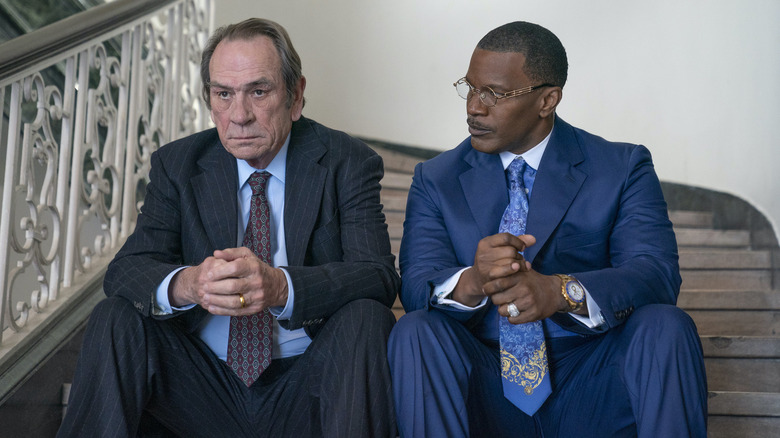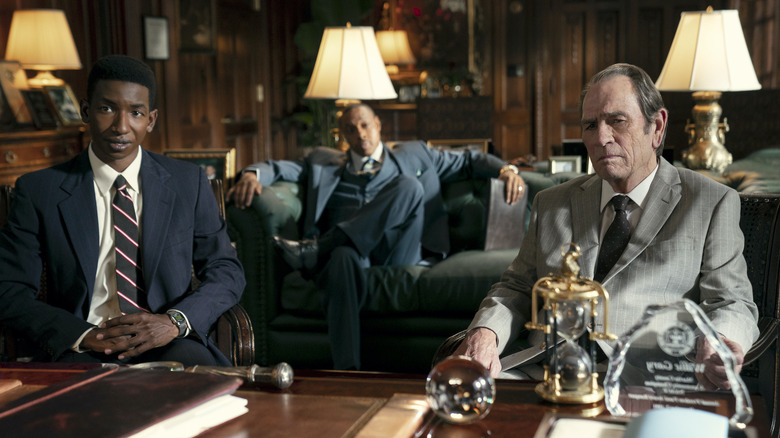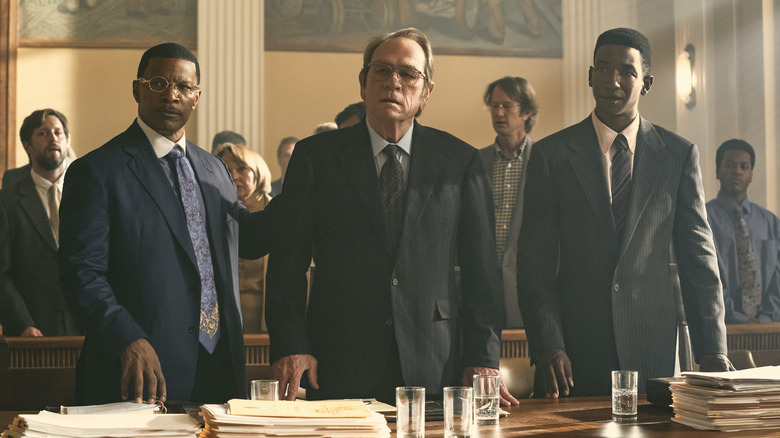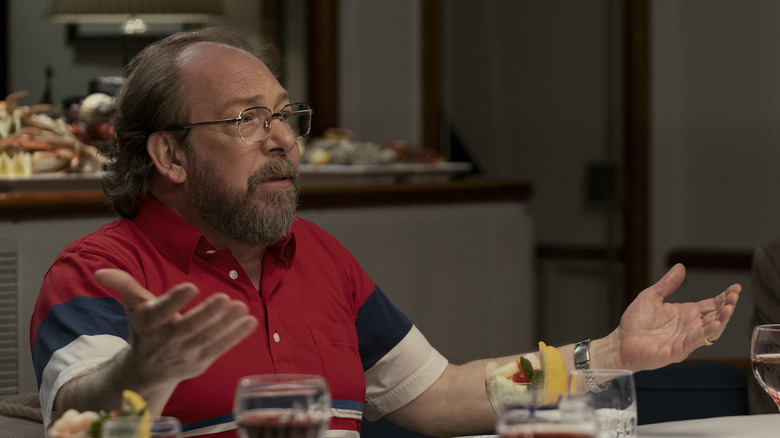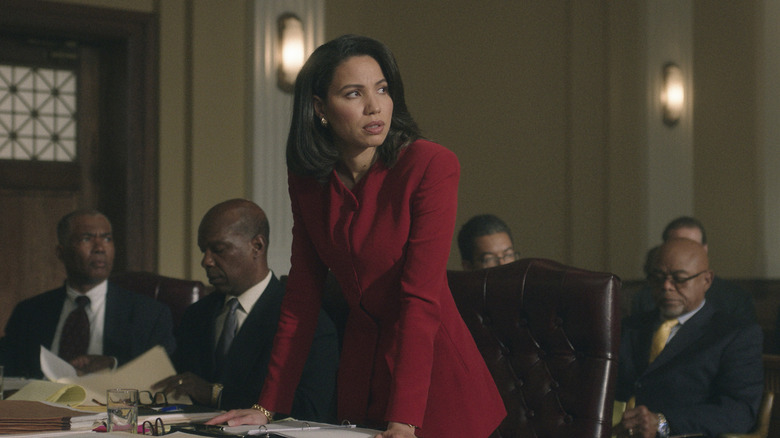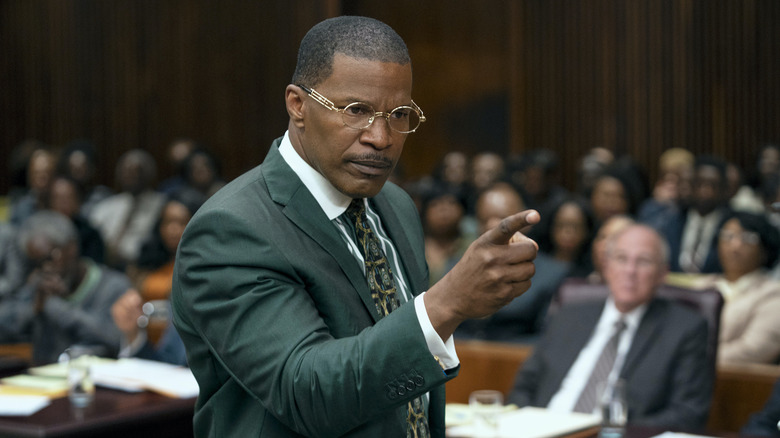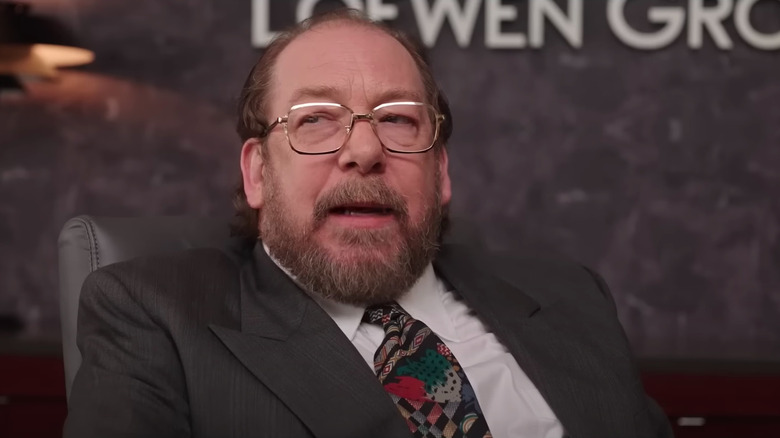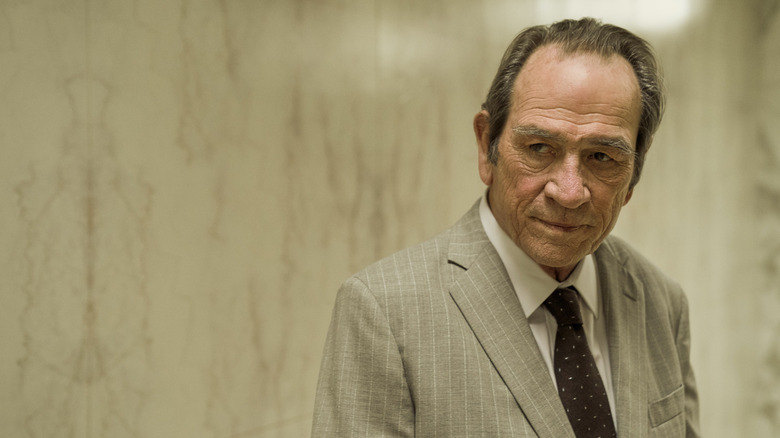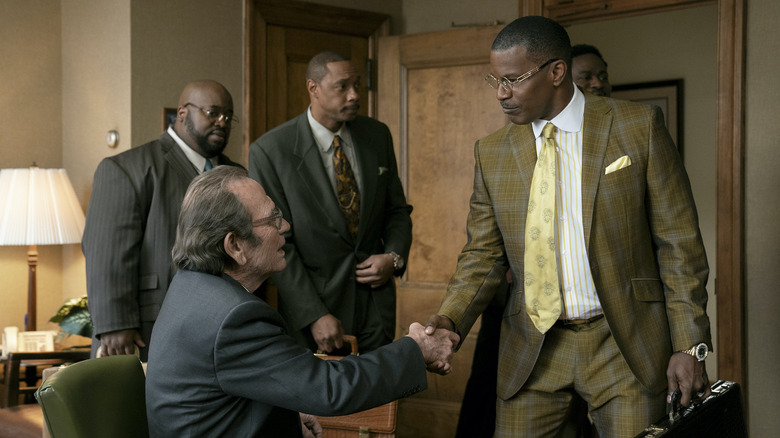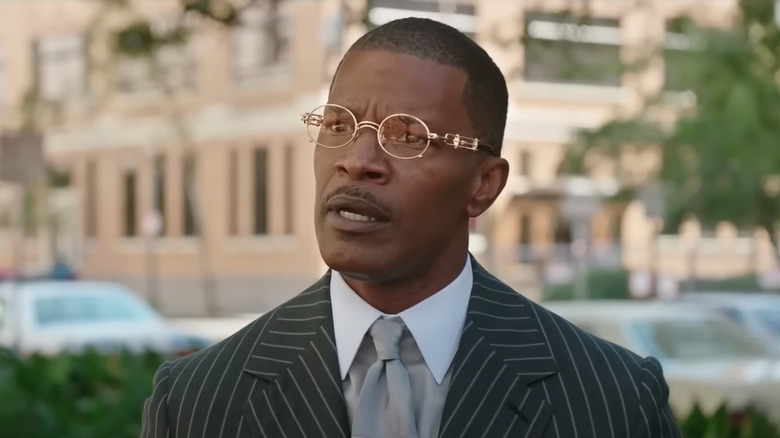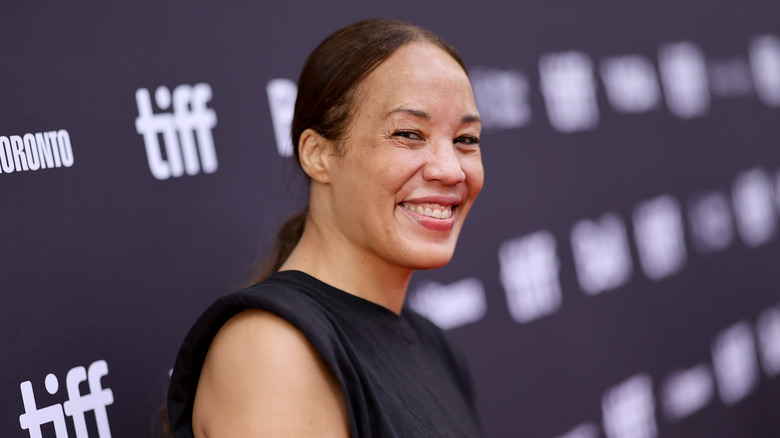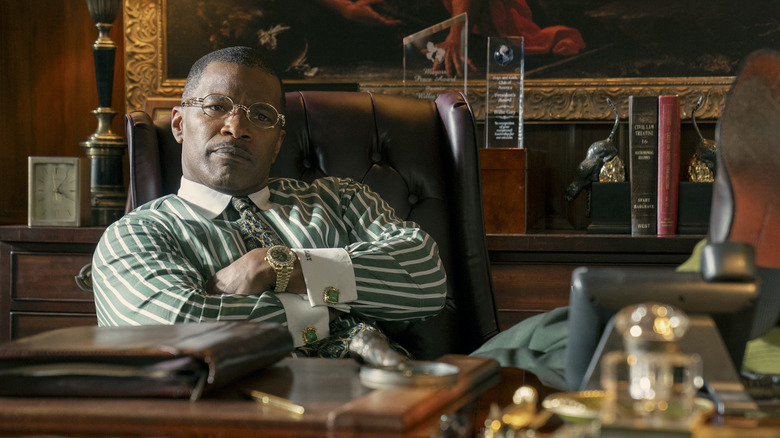The Ending Of The Burial Explained
Contains spoilers for "The Burial"
"The Burial" is a loose dramatization of a court case between Jeremiah O'Keefe (Tommy Lee Jones) and the Loewen Group. It seems straightforward enough, as directed by Maggie Betts, but it turns out there's so much more to the real-life story. O'Keefe was a mild-mannered older gentleman who hadn't sued anyone before, but he, with the help of his young associate attorney Hal Dockins (Mamoudou Athie), not only takes the Loewen Group to court, he brings on Willie Gary (Jamie Foxx) as his lawyer.
Hiring Gary was a strange decision for two reasons. One, Gary had only ever practiced personal injury law, while O'Keefe had a contract case, but perhaps more importantly, O'Keefe was white and Gary made a point of only taking on Black clients. Yet, after a compelling argument by Hal, Gary ended up taking O'Keefe's case, and changing the course of both of their lives.
Like many legal dramas, "The Burial" has plenty of twists and turns. Ultimately what's interesting about the film, though, isn't whether Gary won the case for O'Keefe, but how he won it. This is the ending of "The Burial" explained.
What you need to remember about the plot of The Burial
"The Burial" gets into gear when Jeremiah O'Keefe comes to visit Willie Gary with his case in 1995. He describes how he met with Ray Loewen (Bill Camp), the head of the Loewen Group, about buying three of the eight funeral homes he owns in Mississippi. In addition to the funeral homes, O'Keefe owns a burial insurance business, and the State Insurance Commission has determined that he isn't maintaining the minimums he needs to operate. This is what necessitates the sale.
While O'Keefe and Loewen had a deal, it turns out O'Keefe is the only one who signed the paperwork. That's why, after four months, the Loewen Group still hasn't acted, and Hal Dockins thinks he knows why. He believes Loewen wants the Insurance Commission to take O'Keefe's license so he can't make money, leading him to file for bankruptcy. Then Loewen will come and buy all eight of O'Keefe's funeral homes at yard sale prices.
O'Keefe is incensed by this and decides to sue. But his case ends up in a predominantly Black county in the state, making a Black lawyer an asset. Enter Willie Gary. Gary doesn't do everything right throughout the trial, especially because Loewen has hired a lawyer, Mame Downes (Jurnee Smollett), with an impeccable pedigree to go against him. She not only embarrasses O'Keefe on the stand, but she also accuses Mike Allred (Alan Ruck), O'Keefe's regular lawyer, of having a grandfather who was a member of the Ku Klux Klan.
What happened at the end of The Burial?
The final act of the movie starts with Jeremiah O'Keefe going down to Florida to find Gary at his mother's house. He's come to tell Gary in person that he's going to drop the case. After the truth about Mike Allred's grandfather was revealed, Allred recused himself from the remainder of the case and Gary's team quit. But as O'Keefe is trying to tell Gary he's done, Gary gets a call on his cell phone. It turns out Hal Dockins has found something that could potentially win the case. Gary can't let O'Keefe drop it.
That something is the Loewen Group making a deal with the National Baptist Convention. The Loewen Group had people from the NBC become sales reps for them in exchange for the commission on their sales, but not only did the sales reps make very little money, but the people who paid for policies found they didn't cover all the costs of their loved ones' burials. The Loewen Group made $1.2 billion off this deal in exchange for a $200,000 donation.
Downes calls Loewen to the stand, and when Gary cross-examines him, he gets him to say he never felt bad about profiting off those less fortunate than him. Loewen knows he's lost and Downes calls Gary and O'Keefe to a settlement discussion, except O'Keefe rejects Loewen's offers. Instead, he has the jury take care of the settlement, and they give him even more money than Loewen offered.
Why did the Loewen Group make a deal with the National Baptist Convention?
The Loewen Group apparently had a habit of going to poor neighborhoods and taking advantage of the people there. Earlier in the movie, Mike Allred puts Lorraine McGrath (Erika Robel), a former employee at a Loewen Group funeral home, on the stand. She describes the Loewen Group raising prices in poor areas because they had no competition. So a casket could cost three times what it was worth elsewhere.
The National Baptist Convention deal took this to the next level. Not only was the NBC one of the largest branches of the predominantly Black Baptist denomination, it had a lot of poor people who needed funeral services. As a result, the Loewen Group saw no downside to making the deal with the NBC. While this didn't cost the Loewen Group a whole lot, it cost the churches that were affected plenty. People, including priests and deacons, were accused of caring more about selling funeral services to churchgoers than comforting them in their time of need. The Loewen Group could make a lot of money off the people in the NBC while the constituents of the church would take the hit either when their loved ones died or before, when the people in the church sold them funeral packages.
Why did Mame Downes call Ray Loewen to the stand?
Mame Downes (a character who was a man in the real case) calls Ray Loewen to the stand when she's backed into a corner. People from the National Baptist Convention had just dominated testimony, and while they may not directly have had anything to do with Jeremiah O'Keefe's case, they had everything to do with showing a pattern of shady business practices on the part of the Loewen Group. Downes, in order to get things back on track, decides to call Loewen to testify that Loewen Group's business practices were not illegal.
Although we don't see all of Loewen's testimony with Downes, we get the impression it goes well. From the brief segment we see, he explains that he and his company deal with people honestly, if competitively. It all seems very reasonable and on the up and up. This is what Downes had hoped to show when she called Loewen: A businessman who was competitive but fair. Loewen didn't disappoint. Except that she hadn't anticipated Willie Gary bringing out Loewen's unscrupulous side.
Why is Ray Loewen's testimony so offensive?
Ray Loewen's testimony with Willie Gary is contentious and becomes offensive in the end. First, Gary asks him about Loewen Group's deal with Jeremiah O'Keefe, an expected question, and Loewen explains what happened, specifically that he had invited O'Keefe and his associates to dinner on his boat. While Gary could have picked up on any number of cues from that, he decides to ask Loewen how much he paid for his boat. In fact, he asks him the question several times, each time getting an "I don't know" answer from Loewen.
Ultimately this leads to a tirade by Gary about Loewen's taking advantage of the poor and downtrodden in their most vulnerable moments. Gary is admonished by the court but he's made his point. He only asks Loewen one last question: Did it ever bother him? Loewen says one word, "no." This is all it takes for the tables to be turned. The Loewen Group no longer seems like a reasonable but competitive business, it seems like a company that mercilessly takes advantage of economically disenfranchised people, and worse, it doesn't feel bad about it. The mood in the room shifts.
Why does Ray Loewen's testimony turn the tables on the Loewen Group?
While in theory, Ray Loewen's answer to Willie Gary's final question doesn't have anything to do with Jeremiah O'Keefe's case, in practice the jury sees it as having to do with it, because it suggests that the Loewen Group was going to take advantage of O'Keefe too. As a small business owner, O'Keefe isn't the one with the power in the situation — the Loewen Group is. And while what the Loewen Group did in terms of taking advantage of poor people may not have been illegal, it was undoubtedly unethical.
After having the jury sympathize with the plight of the people at the National Baptist Convention, Loewen could have cut the legs out from under Gary and O'Keefe's argument by presenting a humble picture, but instead, Loewen comes off as cocky and uncaring. This one-two punch makes the jury want to punish Loewen for his shameless business practices, and O'Keefe's trial gives them the opportunity to do that.
Why did O'Keefe reject Loewen's settlement offer?
When the chips are down and it looks like the Loewen Group is going to lose the case, Mame Downes offers a settlement to Jeremiah O'Keefe on Ray Loewen's behalf. While the settlement sum isn't clear to the audience, it doesn't matter, because O'Keefe promptly rejects it. While Loewen questions the wisdom of this, he approves the next sum they offer: $75 million. But, after a smile from his wife, O'Keefe also rejects this offer. Needless to say, Loewen is angry, telling him he'll never see that much money in his lifetime.
But O'Keefe explains it's more than enough for him — it's just not enough for Loewen. He wants to put Loewen out of business, to make the predatory company bleed, and that's the reason he rejects his settlement offers. Loewen tells him that the number it would take to put him out of business is so large, that O'Keefe can't calculate it. But O'Keefe sticks to his guns, even quoting the Tony! Toni! Toné! Song, "Feels Good" to express his positive feelings about rejecting Loewen's offer. And it turns out the jury sees things like he does.
How much does Loewen ultimately end up paying to O'Keefe?
In the trial, Jeremiah O'Keefe is awarded $100 million in compensatory damages and $400 million in punitive damages to be paid by the Loewen Group. Despite taking his chances with the jury, O'Keefe couldn't imagine benefiting so much from the trial. He's amazed and grateful to Willie Gary beyond measure. Ultimately, the Loewen Group only paid O'Keefe $175 million after a settlement, but that was more than enough for O'Keefe and everyone else in his family to never need to work again.
Two years after settling with O'Keefe, Ray Loewen resigned as CEO of his namesake company. Less than a year later, the Loewen Group filed for bankruptcy. It was the end of a company that had taken advantage of people at their lowest. While it's hard to say if other big funeral services companies have similar unscrupulous business practices, at least one company is no longer around.
Meanwhile, O'Keefe and his wife, Annette, started a charity to benefit the socially disadvantaged, including many Black Americans, who were the most affected by the Loewen Group's predatory policies. They also kept all of their funeral homes, becoming southern Mississippi's biggest family-owned funeral business. The ire of the jury against Ray Loewen and the Loewen Group ended up benefiting O'Keefe more than anyone else, but at least O'Keefe put the money to good use.
The movie makes a case for tearing down Confederate monuments
While the movie doesn't put too fine a point on it, in one powerful scene it makes an argument for tearing down Confederate monuments. Willie Gary and Hal Dockins go to the funeral director Ruben Soames's (Fracaswell Hyman) home to hear about how the National Baptist Convention ended up signing the deal with the Loewen Group. But it's the scene after this one that tells us about the legacy of Black people in the area. Soames takes the two men out to see the vast landscape outside his door. While neither Gary nor Hal are sure what this place is, Soames explains. "It's an old slave burial ground. Everybody knows slaves didn't have no money of their own to ever bury their loved ones with a headstone."
Soames continues, "History of Black people in the South, history of Black people in America, of our slave ancestors, is all buried everywhere out here." Soames is arguing that the history of Black Americans is buried deep underground — so deep, in fact, that many people no longer see it. Confederate monuments were put up on the land in the South as a way of glorifying that history instead, but as Soames points out, it's like putting one history on top of another to ensure the slaves' history is buried deep enough that it can no longer be found. It's a subtle but compelling argument for tearing down Confederate monuments and allowing the slaves' history to resurface.
What director Maggie Betts had to say about the film
Director Maggie Betts had a lot to say about the film, particularly the fact that the story is a throwback to '90s courtroom dramas. She decided to embrace this feature of the film. "When I first got the material, I was like, 'This is perplexing, because I don't think courtroom dramas feel contemporary, and I think they feel really dated, and I don't really know what to do,'" Betts told IndieWire. "Maybe the right thing to do is just completely lean into the datedness of it and go for that '90s thing that I grew up watching, that's kind of B-movie and a little bit campy."
Replicating that formula meant making the movie predictable in some way. "It was a very purposeful attempt to recreate the feeling of a '90s courtroom dramedy type thing," she said.
But it also made her more aware of what could be special about the movie, including the commentary on race and class that permeates the film. For that, she took a gradual approach that wouldn't take away from the audience's enjoyment. "I feel like once you enter the courtroom section of the movie ... it starts to become a little bit more serious," Betts explained to the Little Gold Men by Vanity Fair podcast.
Could this lead to more movies or shows about Willie Gary?
"The Burial" could possibly lead to more movies and particularly TV shows about Willie Gary. The lawyer is still alive and has won judgments against some of the country's biggest companies, including Walt Disney and Anheuser-Busch, so there is no shortage of cases that could be dramatized. And Gary seems to be on board for the publicity. In fact, Maggie Betts revealed to IndieWire that Jamie Foxx is "obsessed with making a TV show, like Willie E. Gary and all his lawyers." The idea could be engaging and hilarious, but there are some people who would object to it.
There are, in fact, more than a few people, both ex-clients and a former secretary who have spoken out against Gary. They have accused him of everything from sexual misconduct to bungling their cases. These individuals are incensed that Gary is portrayed in such a positive light in "The Burial." Still, Foxx seemed to love playing Gary, and his voice may be louder than the dozens of people who are against seeing more content about Gary on their screens. Only time will tell.
